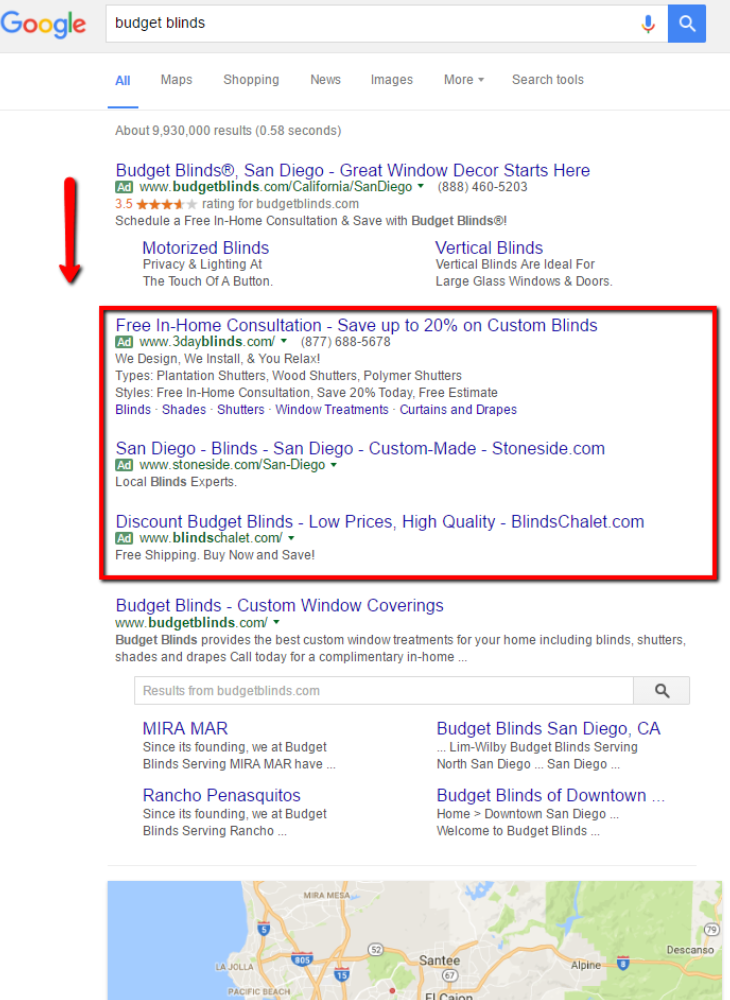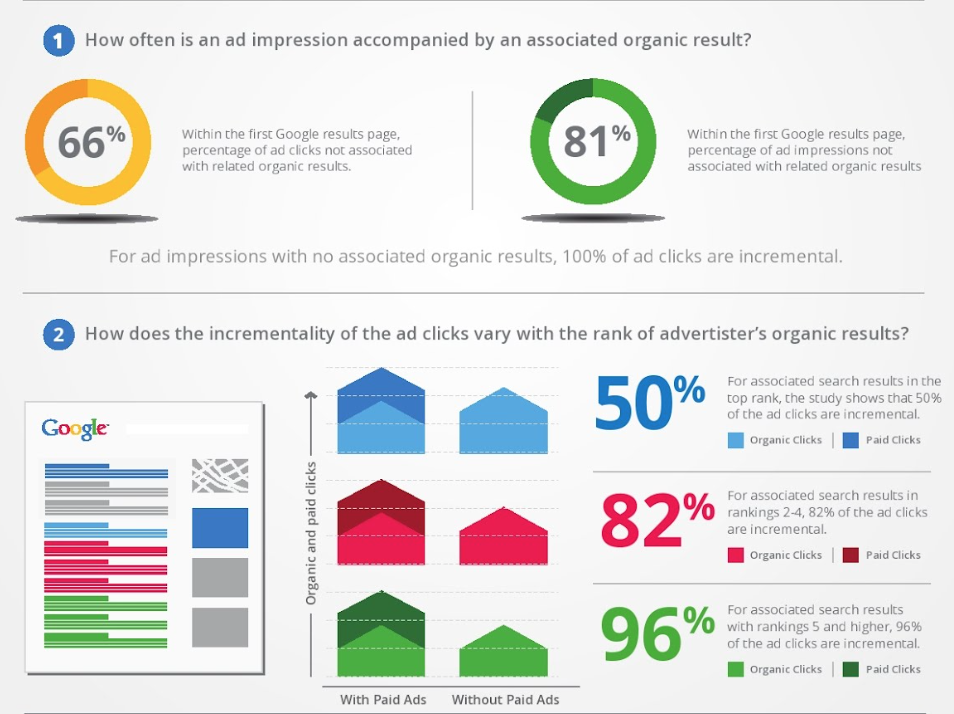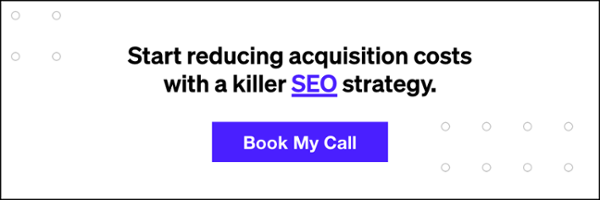SEO vs PPC – How to Use SEO and PPC Together

- 1. Share Keyword Data
- 2. Utilize PPC’s Keyword Data For SEO Purposes
- 3. Utilize SEO’s Keyword Data For PPC Purposes
- 4. Use PPC to Target Competitive Organic Keywords
- 5. Do (not forget) the (not provided) Data!
- 6. Use SEO to Target Expensive PPC Keywords
- 7. Own the SERPs and Maximize Visibility!
- 8. Ad Copy and Meta Descriptions: The Odd Couple
- 9. Attract Repeat Visitors
- 10. Improve Reporting
- 11. Wrapping Up
For some reason, many brand managers, marketing directors, and business owners have the misconception that they have to invest in either SEO or PPC. However, anyone who has worked in the digital space long enough knows that investing in both PPC and SEO is not even a question – it’s a necessity (especially if you have the budget for both).
These two channels are often viewed as completely separate strategies, when in fact, they complement each other more than you may think. Let’s explore the different ways that pay per click and search engine optimization can work together to optimize your marketing campaigns, maximize traffic and conversion opportunities, and debunk the idea that you have to choose between them once and for all!
Share Keyword Data
Keyword research and keyword targeting are crucial in both PPC and SEO campaigns. You bet that the PPC manager spends just as much time performing keyword research as the organic SEO manager. Both channels need to have a thorough understanding of keyword trends, monthly search volume of those keywords, and the competition level behind those keywords.
Utilize PPC’s Keyword Data For SEO Purposes
By linking your AdWords and Analytics accounts together and running a PPC campaign in addition to your SEO efforts, you can gain valuable insights about which keywords are bringing in the most traffic and driving conversions. The SEO team can use these insights to make well-informed, data-driven on-page optimization decisions. Because why waste your time and energy targeting keywords that you know aren’t converting?
Additionally, this is a great proving ground and harvesting space for top-performing long-tail keywords for any websites that may be in an extremely competitive space. The long-tail report from your pay-per-click campaign will also provide an opportunity for content ideation. It is no secret that the search landscape has moved more towards long-tail searches and even full sentence search terms.
By pinpointing the informational and question-based keywords that result from a broad match PPC campaign, we are essentially presented with a blog content hit list of search terms that we know has search volume and has performed well in our industry.
Utilize SEO’s Keyword Data For PPC Purposes
Keyword research is a funny thing – you can spend hours upon hours researching and compiling a list of target keywords that you want to rank for, then not rank for them for months (or ever!). However, you still walk away with a few wins because your website will naturally rank for other long-tail keywords that you might have not even considered in your initial keyword research.
Related: How to Track and Measure Keyword Rankings for Deep Insights
…And better yet, some of these keywords may even convert very well or have a high search volume. PPC can use these long-tail keywords when building out campaigns. Oftentimes, when building campaigns, PPC managers will look at suggested keywords.
However, if the PPC team is in close communication with the SEO department, they can start monitoring these niche keywords or phrases that are already converting visitors organically. You can use this set of previously ignored keywords to surpass your competition.
The “Paid & Organic” report on the Dimensions tab in AdWords is a great place to start. It takes Organic search terms from Google Webmaster Tools and shows you how they fit in with your current paid search strategy. Use this tool to get ideas for new keywords to bid on, to make sure you’re bidding on top-performing Organic keywords to maximize exposure on the search results page, and understand how changes to one channel affects the other. We’ll talk more about all these uses further down.
Use PPC to Target Competitive Organic Keywords
If done correctly, both SEO and PPC campaigns can get you on the highly-coveted and sought after Page 1 of Google. However, as most of you know, the time it takes for that to happen in SEO differs significantly from the time it takes for that to happen in PPC. While it may take months for you to rank on Page 1 for a keyword organically, your PPC team can get you on Page 1 of Google for a multitude of keywords within a day.
Related: AdWords Agency Checklist
So, next time you are waiting to rank for your organic rankings to ramp up, consider running a PPC campaign to target those keywords that you are not yet ranking for organically. During this timespan, your PPC team should be documenting which keywords drive the most traffic and revenue so that your SEO team can leverage this data when it comes their time to shine!
Looking into performance in terms of conversion and engagement, we can make an assessment as to whether we should be targeting these competitive keywords, if we should look to optimize the given landing page for conversions, or to do both!
Do (not forget) the (not provided) Data!
Performance of ad campaigns also provide a great opportunity for PPC to inform SEO of cross-channel opportunities. The dreaded (not provided) designation is, to an extent, the bane of every SEO’s existence, especially when over 95% of organic traffic reports as (not provided)! Cross referencing keyword lists from the PPC team with an organic keyword report from Search Console can help to expose new keywords to target in current organic strategies and has even helped us to provide targets for new pages on our client’s domains.

Use SEO to Target Expensive PPC Keywords
The main drawback of running a pay-per-click advertising campaign? It’s expensive. We get it. Sometimes it’s just not cost-effective to target certain keywords in a PPC campaign. This is where SEO can help out. If the PPC team communicates these desired keywords to the SEO team, they can work towards ranking for these terms organically and the PPC team can spend their time, money, and efforts elsewhere
Or, maybe you have the budget to target these keywords both organically and on the PPC side of things. If this is the case, put your efforts towards getting organic and paid results on page 1 of Google. This way, when someone googles that keyword, your brand will virtually own that SERP.
Own the SERPs and Maximize Visibility!
Speaking of owning the SERPs, make sure that your PPC team is bidding on branded search terms alongside non-branded terms. It may seem counterintuitive to spend money on keywords that you are already ranking for organically, but hey, it’s better to be safe than sorry. The fact of the matter is that your competitors are bidding on your brand name so that their ad will show up on page 1 above your organic listing. This is not good.
Take our client Budget Blinds for example. Blind and Window Coverings is one of the most competitive industries we’ve come across, and they go after their competitors hard! Look at the search result below for our brand term “budget blinds”:

We have great coverage for our organic results, but 3 Day Blinds, Stoneside, and Blinds Chalet will steal our traffic if they have anything to say about it. We drive about ⅓ of our paid search traffic by bidding on our competitor’s keywords. Now imagine how much traffic we would lose if we didn’t have our Paid Search ad listed on top!
By spending the money on branded keywords, you are ensuring that you:
- Have more control over your SERP message
- Are taking up more of that previous SERP real estate
- Are pushing out competitors that are trying to bid on branded terms
Additionally, there is a direct impact that is realized when both organic listings as well as paid ads are found in the SERPs. Google even went to market with a study that proved that approximately 89% of clicks from search ads are incremental.
That means that about 89% of the visits to a given website from ad-clicks are not replaced by organic clicks when the ads are paused. The most intriguing piece to this original study and the subsequent follow up study is that there is a major opportunity loss even when there is an organic listing in the #1 position!

With more of the real estate on Page 1 going towards paid ads as well as the incrementality impact of organic rankings on ad clicks, it is becoming more and more important that brands are investing in both PPC and SEO.
Ad Copy and Meta Descriptions: The Odd Couple
This is a parallel that most would not immediately draw but talk to any true SEO, they would tell you that the meta description in organic listings acts very much as the advertising copy for that page.
With meta descriptions not being a primary ranking factor, this may be an easily glossed-over element when it comes to organic success. Improving click through rate (CTR) is a great way to “do more with what you’ve got”. Said another way, how can we squeeze more out of the current rankings we have for our site?
This provides a powerful opportunity for PPC to share some of their best performing ad copy for pages that have a synonymous organic listing. The question you may be asking is, how?
- Grab a keyword report from Google Search Console
- Pinpoint any target keywords with page 1 rankings
- Evaluate the average position for each keyword against the Google Organic CTR Study
- Cross reference PPC CTR for the same keywords and adopt only the best performing ad copy as metadata
Voila! Now you have a quick solution to help maximize CTR in your organic listings. That is not to say that this is an automatic thing as the intentions for searchers with a PPC listing vs an organic listing can vary but this is a great starting point to test and analyze.
So, as with any SEO efforts, the key will be to document and track the performance of this element as time moves along. If CTR dips or does not improve, rinse and repeat. Don’t be afraid to try writing your own new-and-improved meta descriptions if the PPC ad copy just doesn’t resonate with your audience.
Attract Repeat Visitors
While organic search is extremely effective at driving new traffic to your website, it is not as effective at bringing them back per se. This is not ideal considering the fact that most website visitors do not convert during their first visit to your site (especially for more expensive or higher commitment products and services).
Related: Google Analytics Remarketing Audiences – Traffic Sources
The PPC team can build upon SEOs efforts by implementing a remarketing campaign to bring these visitors back to your site. Not only does this increase the chances that the visitor will convert the second time around, but it also ensures that those initial efforts by the SEO team don’t go to waste.
Improve Reporting
We’ve all been there – your marketing vertical doesn’t do so hot one month and going into the reporting meeting is like walking in front of a firing squad. Aka not good. Well, what if we told you that when you have an integrated, cross-channel approach, it isn’t so bad if your channel doesn’t perform as well one month? Sound too good to be true? It’s not!
Related: How to Report Properly in SEO
When running SEO and PPC campaigns together, you can show the client how each of the channels assisted in final conversions from the other source. In addition, when you run SEO and PPC together, you have the unique benefit of showing the client how well each channel did individually and how each channel worked to bolster the others efforts. What more could you ask for!?
Wrapping Up
As you can see, although SEO and PPC are technically two separate verticals, when used together, the results are tremendous. Marrying an SEO strategy and a PPC marketing campaign together will not only help you gain visibility and authority in the minds of your customers, but it will help take your online marketing strategy to the next level and long-term success. Talk to the search engine marketing experts today!
Our Editorial Standards
Reviewed for Accuracy
Every piece is fact-checked for precision.
Up-to-Date Research
We reflect the latest trends and insights.
Credible References
Backed by trusted industry sources.
Actionable & Insight-Driven
Strategic takeaways for real results.







